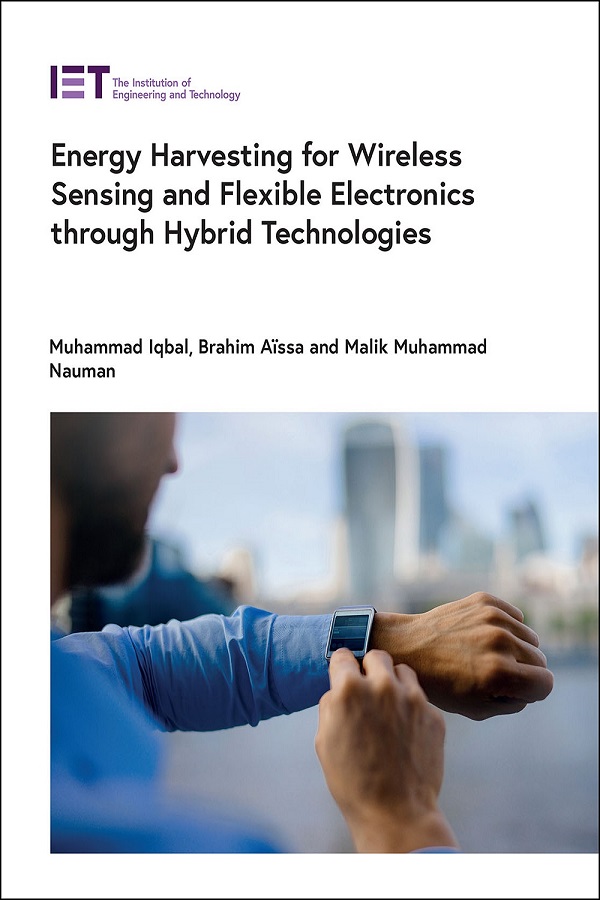- Agricultural Engineering and Technology
- Applied Physics
- Built Environment
- Computing and Networks
- Control, Robotics and Sensors
- Electrical Regulations
- Electromagnetics and Radar
- Energy Engineering
- Healthcare Technologies
- History and Management of Technology
- IET Codes and Guidance
- Manufacturing
- Materials, Circuits and Devices
- Model Forms
- Security
- Telecommunications
- Transportation

Energy Harvesting for Wireless Sensing and Flexible Electronics through Hybrid Technologies
by Muhammad Iqbal, Brahim Aïssa, Malik Muhammad Nauman
As wearable microelectronics are becoming ubiquitous, there is a growing interest in replacing batteries with a means of harnessing power from the user's environment via embedded systems. Efforts have been made to prolong the harvester's operational lifetime, overcoming energy dissipation, lowering resonant frequency, attaining multi-resonant states, and widening the operating frequency bandwidth of the biomechanical energy harvesters. Such technological advances mean harvesting energy is a viable solution for sustainably powering wearable electronics for health and wellbeing applications, such as continuous medical health monitoring, remote sensing, and motion tracking.
The book introduces the concepts of vibration-based piezoelectric, electromagnetic and hybrid energy harvesters, and addresses their modelling, fabrication and characterization. It covers the fundamental principles and details the most advanced functions, including biomechanical and space applications. Detailed descriptions and explanations of a wide range of related concepts are provided, such as multi-degrees of freedom hybrid piezo-electromagnetic insole energy harvesters, non-linear 3D printed electromagnetic vibration energy harvesters, and finite element analysis of hybrid piezoelectric and electromagnetic energy harvesting. Also included are trends towards design, modelling, fabrication, and characterization of nonlinear multimodal electromagnetic and hybrid piezo-electromagnetic insole energy harvesters, as well as describing and explaining electromagnetic and hybrid piezo-electromagnetic energy harvesting technologies. The book provides an extensive and up-dated survey of the published scientific and technical articles and conference reports, covering more than 340 references. The book concludes with an outlook from the authors on likely future developments and applications.
Energy Harvesting for Wireless Sensing and Flexible Electronics through Hybrid Technologies provides in-depth coverage of the topic for researchers from academia and industry, as well as advanced students with an interest in the field.
About the Author
Muhammad Iqbal is an assistant professor at the Institute of Computer and Software Engineering, Khwaja Fareed University of Engineering and Information Technology, Rahim Yar Khan, Pakistan. He received his PhD degree in systems engineering with distinction from the Faculty of Integrated Technologies, Universiti Brunei Darussalam, Brunei, in 2020. He holds a Master of Science in mechatronics engineering automation and control from University of Engineering and Technology, Peshawar, gained in 2016, and Bachelor of Science degree in computer engineering from COMSATS University Abbottabad, Pakistan, in 2012. His area of research includes vibration/wind-based energy harvesting, autonomous wireless sensors, MEMS/NEMS devices, biomechanics, and additive manufacturing, among others. He is a professional member of Pakistan Engineering Council, Member IEEE, and approved PhD supervisor by the Higher Education Commission (HEC), Pakistan.
Brahim Aïssa earned his PhD in materials science and energy from INRS-EMT, Canada, before joining MPB Communications Inc. where he worked in the Space & Photonics department until 2014. In September 2014, he joined the Qatar Environment and Energy Research Institute (QEERI) as a senior scientist. He collaborated with the EPFL, Switzerland, where he twice hit the world record for power conversion efficiencies in quasi-mono silicon solar cells. He has published more than 200 refereed papers, five books, and holds many patents. Dr. Aïssa has numerous international awards, prizes, and fellowships including the prestigious NPI award from the European Space Agency, the Australian Endeavour fellowship, and the Canadian NSERC R&D industrial fellowship. His PhD and MSc theses were awarded the Top prize for the best scientific achievement, and a part of his work was selected among the best TOP-10 scientific discoveries in Canada. Dr. Brahim is an associate editor in 8 different journals, and a senior fellow of three UNESCO chairs, including the Nanoscience and nanotechnology (UNISA/South Africa), the African Network in Nanoscience (NANOAFNET/South Africa), and the Materials and Technologies for Energy Conversion, Saving and Storage (MATECSS/Canada).
Malik Muhammad Nauman is an associate professor at the Faculty of Integrated Technologies, Universiti Brunei Darussalam and has a PhD in Mechatronics Engineering from Jeju National University, South Korea, in 2012. He has published extensively in multidisciplinary areas of 2D/3D printing of energy devices involving functional and smart materials, kinetic energy harvesting via piezoelectric, electromagnetic and hybrid methods, shape memory alloys, and inverse heat and mass transfer. He is a seasoned academician having more than 8 years of teaching undergraduate and graduate courses related to manufacturing, energy engineering, and innovation and entrepreneurship, which enables him to work very closely with students making them skilled engineers, effective innovators, and future entrepreneurs. He is also the ABET Accreditation Coordinator at the Faculty of Integrated Technologies. He is a life-time member of the Pakistan Engineering Council and The American Society of Mechanical Engineers.
Publication Year: 2023
Pages: 230
ISBN-13: 978-1-83953-497-3
Format: HBK
